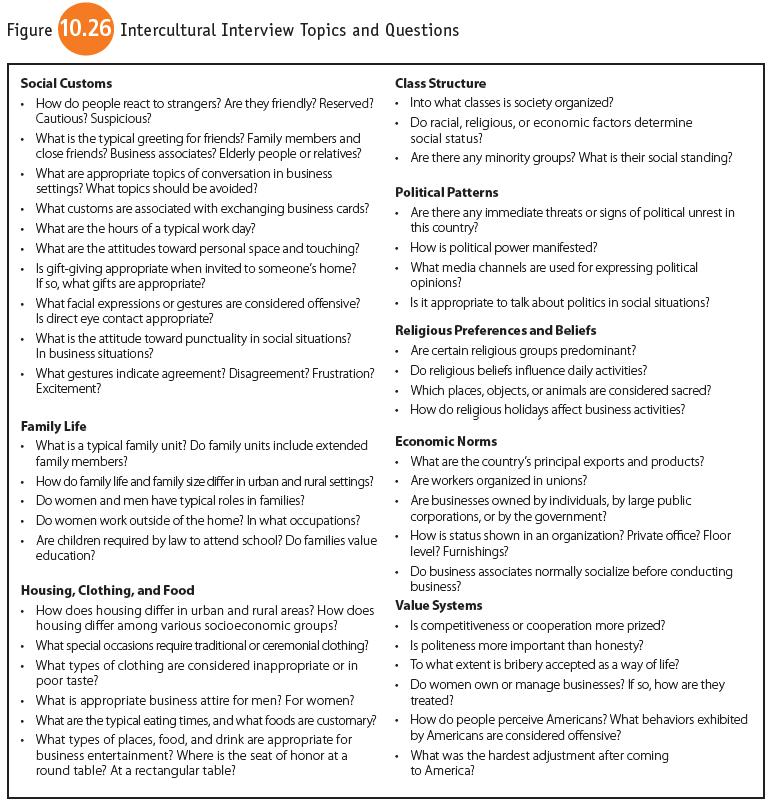Question:
U.S. businesses are expanding into foreign markets with manufacturing plants and branch offices. Many Americans, however, have little knowledge of or experience with people from other cultures. To prepare for participation in the global marketplace, you are to collect information for a report focused on an Asian, Latin American, European, or African country where English is not regularly spoken. Before selecting the country, though, consult your campus international student program for volunteers from other countries who are willing to be interviewed. Your instructor may make advance arrangements with international student volunteers.
Your Task. In teams of three to five, collect information about your target country from electronic databases, the Web, and other sources. Then invite an international student from your target country to be interviewed by your group. As you conduct primary and secondary research, investigate the topics listed in Figure 10.26. Confirm what you learn in your secondary research by talking with your interviewee. When you complete your research, write a report for the CEO of your company (make up a name and company). Assume that your company plans to expand its operations abroad. Your report should advise the company's executives of the social customs, family life, societal attitudes, religious preferences and beliefs, education, and values of the target country. Remember that your company's interests are business oriented; do not dwell on tourist information. Compile your results and write the report.

Transcribed Image Text:
Figure 10.26 Intercultural Interview Topics and Questions
Social Customs
How do people react to strangers? Are they friendly? Reserved?
Cautious? Suspicious?
.
.
.
.
.
• What are the attitudes toward personal space and touching?
Is gift-giving appropriate when invited to someone's home?
If so, what gifts are appropriate?
.
.
.
What is the typical greeting for friends? Family members and
close friends? Business associates? Elderly people or relatives?
.
What are appropriate topics of conversation in business
settings? What topics should be avoided?
What customs are associated with exchanging business cards?
What are the hours of a typical work day?
Family Life
• What is a typical family unit? Do family units include extended
family members?
.
What facial expressions or gestures are considered offensive?
Is direct eye contact appropriate?
.
Religious Preferences and Beliefs
Are certain religious groups predominant?
• What gestures indicate agreement? Disagreement? Frustration? Do religious beliefs influence daily activities?
Excitement?
What is the attitude toward punctuality in social situations?
In business situations?
Housing, Clothing, and Food
How does housing differ in urban and rural areas? How does
housing differ among various socioeconomic groups?
How do family life and family size differ in urban and rural settings?
Do women and men have typical roles in families?
Do women work outside of the home? In what occupations?
Are children required by law to attend school? Do families value
education?
What special occasions require traditional or ceremonial clothing?
What types of clothing are considered inappropriate or in
poor taste?
What is appropriate business attire for men? For women?
What are the typical eating times, and what foods are customary?
.
• What types of places, food, and drink are appropriate for
business entertainment? Where is the seat of honor at a
round table? At a rectangular table?
Class Structure
Into what classes is society organized?
• Do racial, religious, or economic factors determine
social status?
• Are there any minority groups? What is their social standing?
Political Patterns
Are there any immediate threats or signs of political unrest in
this country?
.
.
.
.
.
.
.
.
Economic Norms
What are the country's principal exports and products?
Are workers organized in unions?
.
How is political power manifested?
What media channels are used for expressing political
opinions?
Is it appropriate to talk about politics in social situations?
.
Which places, objects, or animals are considered sacred?
How do religious holidays affect business activities?
How is status shown in an organization? Private office? Floor
level? Furnishings?
•
Do business associates normally socialize before conducting
business?
.
Value Systems
• Is competitiveness or cooperation more prized?
Is politeness more important than honesty?
To what extent is bribery accepted as a way of life?
.
Are businesses owned by individuals, by large public
corporations, or by the government?
Do women own or manage businesses? If so, how are they
treated?
How do people perceive Americans? What behaviors exhibited
by Americans are considered offensive?
What was the hardest adjustment after coming
to America?







